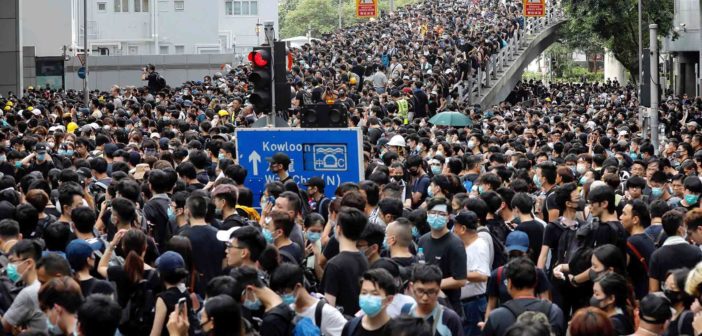By: Zhiwen Yang, Contributing Writer
China is a rising developing country, it’s youth’s sense of innovation and social responsibility bear the mission of the country’s future development. The consciousness of the youth is the hope of this country, which is the future of the city.
At midnight on June 30, 1997, the British flag was lowered, and the Hong Kong and Chinese flags were raised at midnight to signal Hong Kong’s return to Chinese sovereignty after 156 years of British rule. At that special moment, people from all over China celebrated the return of Hong Kong to China in front of the Television.
Hong Kong was a trendy, enthusiastic, and motivated city in the 1980s and 1990s because people of that era believed in their dreams. Hong Kong people are hard-working, have a pioneering spirit, and self-improvement. This is the Hong Kong city spirit in my memory.
As a Chinese person, I have lived on the Mainland for nearly 30 years. When I was young, I watched Hong Kong movies and worshiped their actors. I was interested in their daily lives and stories, believing that one day, my dream would also come true.
However, the recent violence in Hong Kong has made me wonder: Where is the spirit of Hong Kong? Why do young people in Hong Kong use this way to express their emotions? Is violence the only expression? During this period, because of the escalation of the Hong Kong protests, the airport and subway station was closed for a few days. The pride of Hong Kong, the International Airport was no longer filled with tourists from all over the world. People had to choose airports in other cities to make alternative flight arrangements.

The national spirit of Hong Kong has never left, however, the younger and older generations of Hong Kong do not have the same understanding of the spirit of the city.
The young people of Hong Kong are now dressed in black and use black masks to cover their faces. In many videos, they are seen beating police and international travelers who they have never met before, with anger and violence full being shown in public places.
A dear friend of mine Shaojun Lin, a resident of Hong Kong spoke concerning the riots, and the effects it was having. Lin said she was safe but very anxious. She said that from 2008, the Hong Kong government had encouraged mainland graduates to stay in Hong Kong. After graduation, mainland undergraduates are allowed to stay in Hong Kong for 12 months and work or continue their studies. If they have lived in Hong Kong for seven consecutive years, they can apply to be Hong Kong residents.
According to local media reports, within the last three years 60 percent of mainland students in the school have continued their studies after graduation, 37 percent stayed in Hong Kong, and only 3 percent returned to the Mainland. The pressure of employment competition is growing, however, because Hong Kong lacks manufacturing, because of the financial crisis in 2008, the development of the financial industry that Hong Kong has been proud of is dismal. Young people, with little to no education find it increasingly difficult to find a job. At the same time, the influx of a large number of mainland immigrants has intensified the competitive pressure.
According to Lin, “More than 30,000 adolescents aged 15 to 24 accounted for about a quarter of the unemployed population. Last year, the government recruited a secretarial post, and there were thousands of people interviewing and competing. There is no way out for the young people of Hong Kong and they have no confidence in the future that is waiting for them.”
China’s “one country, two systems” is the primary national policy put forward by the Chinese government, to achieve peaceful reunification of the country. The policy would allow Hong Kong to remain the independent legal systems and police forces of the nation. Global financial turmoil and the surge in new immigrants from the Mainland, put the identity of Hong Kong’s youth under social pressure. Regrettably, the Hong Kong government has not proposed an effective policy, to assist with the problems faced. Additionally, a large number of mainland immigrants invest in real estate to push up housing prices, influencing the conflict between mainland tourists or immigrants and residents annually.
October 1 was the 70 anniversary of the People’s Republic of China, and President Xi Jinping is facing continued, and increasing challenges with the People’s Republic of China. These problems include the ongoing US-China trade war and the riots in Hong Kong. According to BEIJING (AP), on Sept. 30 2019, Chinese Communist Party leader and President Xi Jinping renewed his government’s commitment to allowing Hong Kong to manage its affairs amid continuing anti-government protests in the semi-autonomous Chinese territory. Xi’s approach seems to be to wait the crisis out, even as the costs continue to grow.
This means a perpetual conflict between the Hong Kong government and the people of the nation without an end in the foreseeable future. The government cannot achieve a true victory through repression; and the people in Hong Kong cannot obtain an agreement with the government to secure the future.
The Fugitive Offenders and Mutual Legal Assistance in Criminal Matters Legislation (Amendment) Bill 2019 (allowing arrangements for legal assistance to be made between Hong Kong and anywhere outside of Hong Kong) is said to be the cause for the riots, however it is most likely an excuse. The bill acts as a muzzle to the voices in Hong Kong that are against the government. The national spirit of Hong Kong has never left, however, the younger and older generations of Hong Kong do not have the same understanding of the spirit of the city. Hong Kong’s spirit can make up for the lack of political direction; however, without the unified spirit of the city, the young people will lose the awareness of their own identity and generate anxiety about the future.





